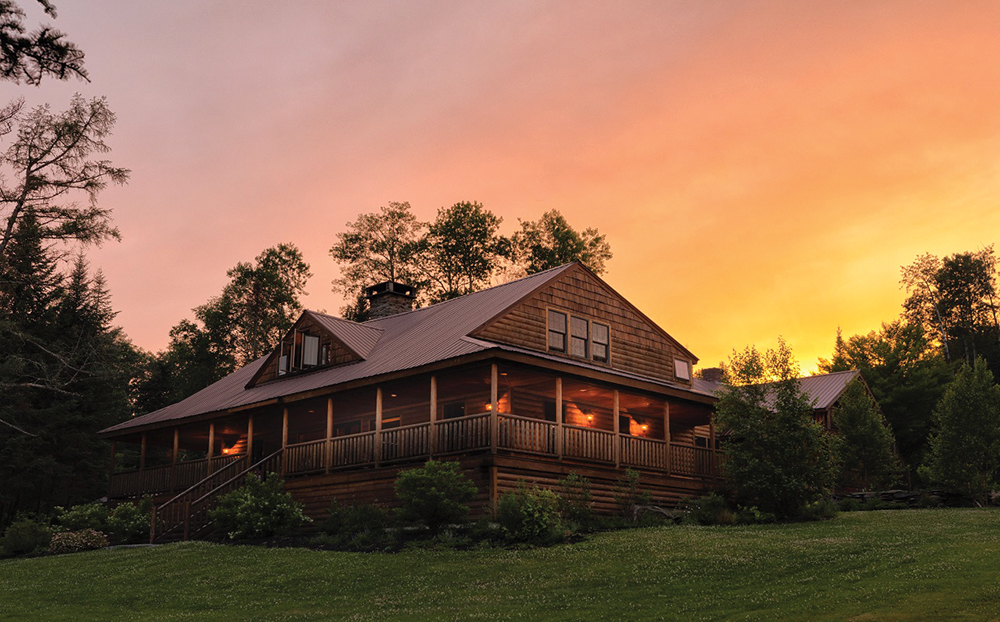 The Glen Lodge on the property of At Bear Tree. (Courtesy)
The Glen Lodge on the property of At Bear Tree. (Courtesy)
When Richard Lapoint graduated from Pittsburg School in 1968, he was one of 17 seniors in the red brick building that still houses pre-K through high school-aged students. The 2020-21 school year produced only six graduates.
The population of the state’s northernmost town hasn’t changed that much over the years. It stood at 726 after the 1970 census, peaked at 902 in the 1990s and now stands at 820.
But the school-aged share of the population has declined dramatically, says Lapoint, who has watched his community change during the 40 years he worked for the local police department, serving as chief for 28 years before retiring in 2015.
He’s now one of three selectmen.
“We’ve had a big increase in the elderly population, while a lot of the young people moved out of the area,” he says. “There wasn’t a whole lot to keep them here.”
New Hampshire is experiencing a statewide “graying” trend, but North Country towns like Pittsburg are aging faster than the state average. The median age statewide is 43, while in Pittsburg it’s 59. More than half the population of Pittsburg (61%) is aged 55 and over. There are only 64 school-aged children in the town.
You might conclude from those stats that Pittsburg, like many isolated rural towns in NH and beyond, has evolved into a sleepy retirement community with a lackluster economy. Boy would you be wrong.
The Snowmobile Capital of New England, as the town is known, has also become the go-to destination for off-highway recreational vehicles (OHRVs), in addition to its long-established reputation as one of the most desirable locations for hunting, fishing and hiking in New England.
All About Geography
Pittsburg is in what could be called “the lucky geography club.” Its vast land mass of nearly 300,000 square miles (the largest of any municipality in New England) hosts a cluster of lakes that comprise the headwaters of the Connecticut River along with other streams and ponds.
Thousands of miles of OHRV and snowmobile trails crisscross the community, along with the newly created Cohos Trail that offers a quieter path.
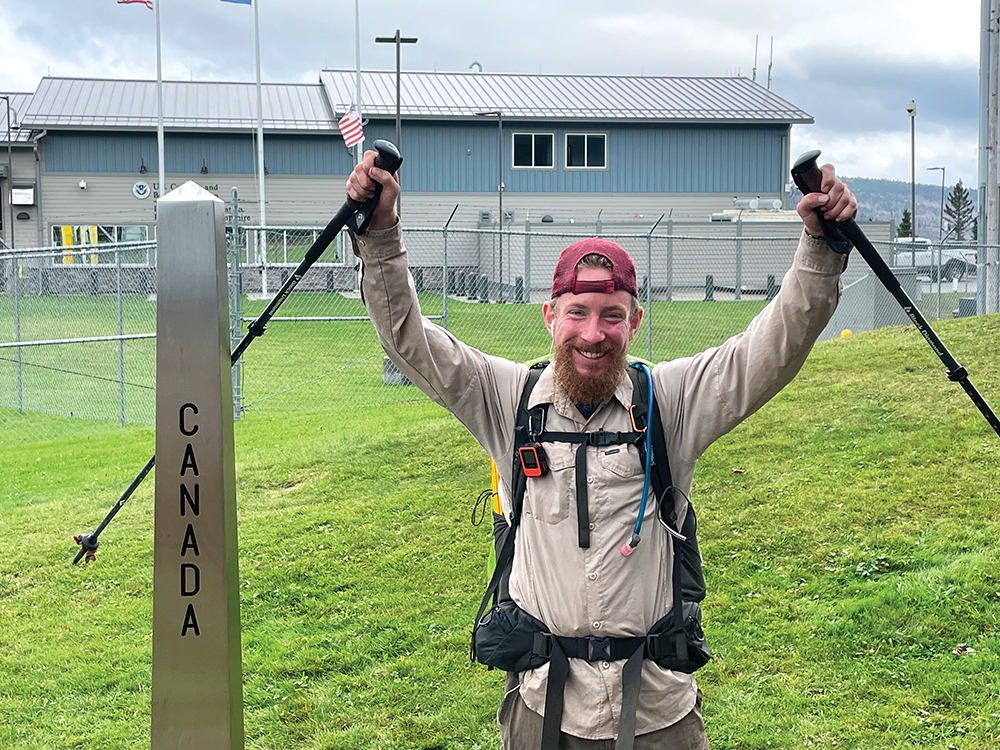 Hiker Matt Popp finishing the Cohos Trail at the Canadian border. (Chris Starkey)
Hiker Matt Popp finishing the Cohos Trail at the Canadian border. (Chris Starkey)
Pittsburg real estate transactions are matching southern NH prices; lodges are already filling up for 2023; buildable lots are being snapped up for new “camps;” and some of the manufacturing that was once a mainstay of the local economy, like Ethan Allen in nearby Beecher Falls, Vt., is gearing up again.
“It used to be we had the summer for fishing and recreation and then the fall for hunting,” says Lapoint. “During the wintertime, some of the lodge owners would go to work at Ethan Allen because there was nothing going on in the wintertime. The lodges were mostly closed because there was no snowmobiling back then. Once the snowmobile industry came to town in the 1970s and 1980s, a lot of the lodges got winterized.”
The rapid growth of interest in ATVs and other off-road vehicles in more recent years helped clinch Pittsburg’s reputation among outdoor enthusiasts as a four-season destination, busy but off the beaten path.
The Pittsburg Ridge Runners snowmobile club with nearly 4,000 members maintains more than 200 miles of groomed snowmobile trails, with industrial-sized grooming equipment that would be the envy of many ski resorts. The state dedicates a portion of the receipts from snow machine registration fees to help finance clubs like the Ridge Runners.
The Great North Woods Riders ATV Club, also located in Pittsburg, maintains approximately 120 miles of trails suitable for OHRVs on 8,000 acres between Indian Stream and Perry Stream as part of the 1,000 miles of interconnecting ATV trails in Coos County known as Ride the Wilds.
Peaceful Options
Those who prefer non-motorized outdoor recreational activities, like hiking, biking, canoeing or kayaking are also discovering Pittsburg, thanks in large part to the Cohos Trail, a 170-mile foot trail that’s been under construction since the 1990s and for the most part, is set away from the OHRV and snowmobile traffic.
The trail runs from southern Crawford Notch in the White Mountain National Forest through Pittsburg to the Canadian border and continues on the Canadian side to Mount Megantic or Mount Gosford in Quebec. While hikers are lined up like shoppers on the Macy’s escalator at popular locations in the White Mountains, the Cohos Trail is still relatively undiscovered.
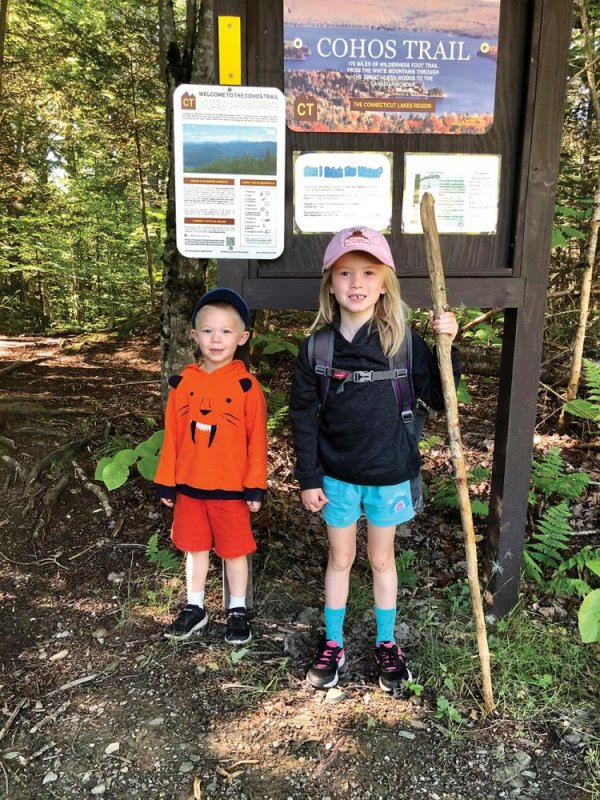 Noah and Elise Shallow at the head of the Bog Bridge Trail, part of the Cohos Trail. (Jennifer Shallow)
Noah and Elise Shallow at the head of the Bog Bridge Trail, part of the Cohos Trail. (Jennifer Shallow)
“Obviously people hike in the Whites, that’s understood,” says Kim Nilsen, a former reporter with the Coos County Democrat who founded the Cohos Trail Association in 1998, helped design the trail in the ensuing years and still serves as chair of the nonprofit. “But north of Lancaster, hiking was not in the DNA of the county at all. The Cohos Trail brought a whole new user group into this part of the world. If you go into Pittsburg now in summer at Young’s Store or the Happy Corner, you’ll see hikers with packs all the time. That’s a whole new user group that didn’t exist before. It’s never going to be like snowmobile or ATV money, but it’s a new group with a few dollars in their pockets.”
A Different Path
Visitors outnumber year-round residents most months of the year, feeding a hospitality economy built around places like the Lopstick, Tall Timber, Powder Horn and At Bear Tree, not to mention all the privately owned seasonal cabins and camps.
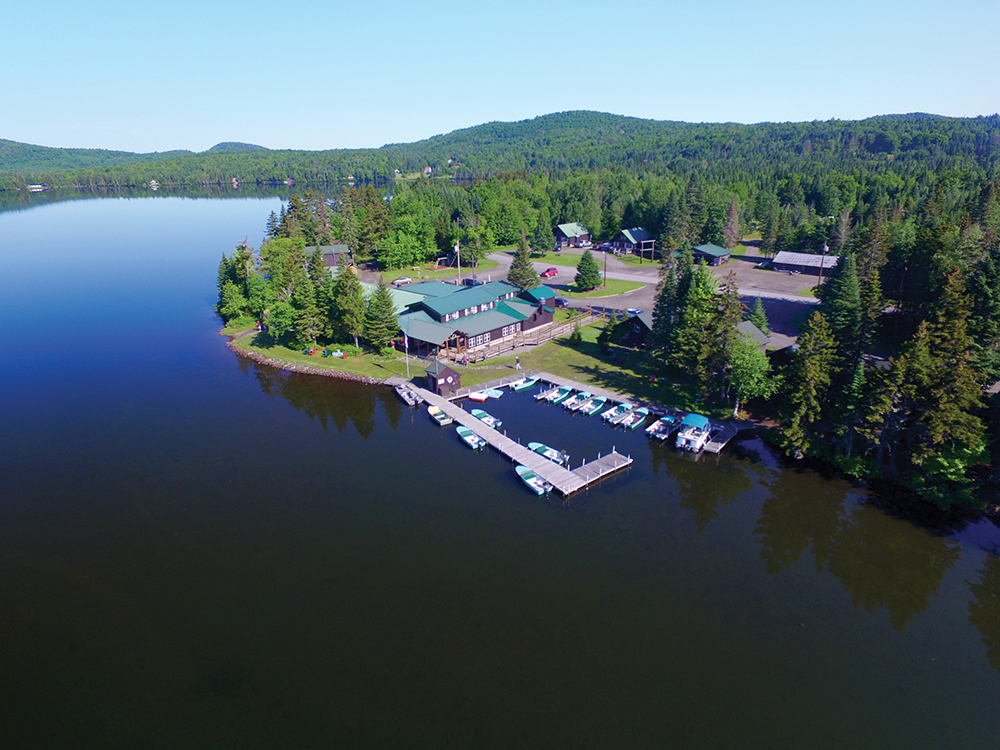 Tall Timber Resort. (Courtesy)
Tall Timber Resort. (Courtesy)
“This is a place that still has some strong connection to its history of commercial forestry and logging,” says Jack Savage, president of the Society for the Protection of NH Forests, which manages some of the timberland in the community. “That said, Pittsburg has been transformed or transformed itself into a recreation destination, and that’s a different kind of economy. The basis of that are camps, or second homes. Much of what happens there is people buy a camp, and they go back there again and again and again.”
Savage says that recreation focus makes the town unique. “Pittsburg is not representative of Coos County. They are on a particular kind of pathway,” he says.
That different path is perhaps most evident in the contrasting property valuations and tax rates of Coos communities. The total value of land in Pittsburg, according to the state’s 2020 equalization survey, is $345 million. The only Coos County municipalities with higher valuations are Berlin, a city of 10,000 (at $556 million), and Carroll, which hosts the Bretton Woods Resort (at $435 million).
In Berlin, where tax collection leans heavily on residential property, the most recent equalized tax rate is around $30 per $1,000 of assessed property value, whereas in Carroll it’s $16 and in Pittsburg, it’s $13.
Spike in New Homes
Much of the reason for that low tax rate in Pittsburg is the thousands of acres of forest still in commercial production and assessed at high value. But there has also been a spike in the quality and value of new homes being built, especially along the lake fronts.
One of those is a 7,000-square-foot Victorian log home built by retired insurance executive and former Pittsburg
selectman Steve Ellis, elected for two three-year terms starting in 2010 and ending in 2016 as chair.
Pittsburg residents are a combination of natives like Lapoint and newcomers like Ellis—a dynamic that has been consistently reflected in local government and the local economy.
Ellis purchased property in Pittsburg in 1971 as a young man, planning to retire there some day after years of fishing trips with his father, a Dartmouth surgeon. He became a year-round resident in 2008 and began work on the log home in 2014.
“Pittsburg to me is heaven,” says Ellis, whose property overlooks First Connecticut Lake. “We have everything we want, and it’s away from the hustle and bustle. You get to a point in life where shopping isn’t that important and these days most people go online to shop anyway. It’s not for everyone, and I can understand that. But if you like the outdoors, the wildlife up here is incredible.”
A moose sighting along the northern stretches of Route 3, known as Moose Alley, isn’t a sure thing these days, given the effect of the tick infestation, but that situation may be improving. “The moose that we do see look more and more healthy, which is nice,” says Ellis.
There is some tension in the North Country between those who prioritize peace and quiet versus those who appreciate the financial rewards the local economy reaps from motorized sports. “I think that’s something we have to continue to work on to make both parties happy,” says Ellis.
In March 2019, town meeting voters in Pittsburg and three neighboring towns overwhelmingly defeated a petitioned warrant article to ban all-terrain vehicles from town roads. In Pittsburg the vote was 54 in favor to 166 opposed.
A Real Estate Rush
The pandemic had a devastating effect on the hospitality industry, but not so much in Pittsburg. “We hate to say it, but COVID was actually good for our business,” says Chantal Carney, manager of sales and marketing for At Bear Tree, one of the popular cabin and lodge resorts.
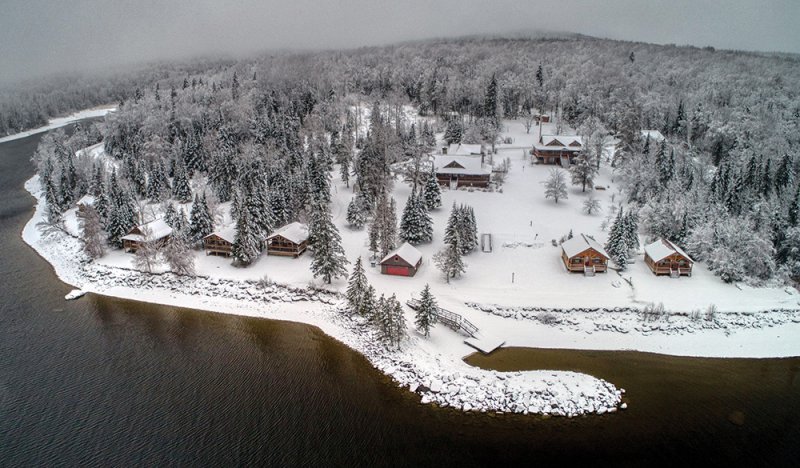 Aerial view of At Bear Tree resort. (Courtesy)
Aerial view of At Bear Tree resort. (Courtesy)
“As soon as travel restrictions were lifted and people could venture out of state, we got slammed,” she says. “It brought a whole new group of people who probably wouldn’t have ventured out into the woods before.”
The same could be said for the real estate market, which has taken off as remote work becomes more the norm and the town’s internet and cell phone service has improved. But while increasing real estate prices help existing homeowners, they exacerbate the town’s most pressing problem—attracting and retaining young families.
Carney is an exception to that rule, born and raised in nearby Cannan, Vt. She’s lived in the area her entire life, worked at Ethan Allen for 23 years, became a catering manager in Whitefield and came to work for At Bear Tree in 2009.
The kids she grew up with? “They’ve mostly taken off,” she says. “The population here and in all the surrounding towns is middle-aged to seniors because the kids venture off and they don’t come back.”
A Gathering Place
When newcomers do take up permanent residence, other than retirees, it’s often due to a change in business ownership. Such was the case for Dan Marcinik, the new owner of Young’s General Store.
After working in the aviation industry in the Seacoast area for 25 years, he spotted an ad by a business broker listing the store/cafe for sale. “I was lucky enough to get into the final round and acquire the store,” says Marcinik, who took ownership in April of 2021.
 Young’s General Store employees JD Marcinik and Karen Kidder-Prehemo. (Courtesy)
Young’s General Store employees JD Marcinik and Karen Kidder-Prehemo. (Courtesy)
The NH Liquor Commission granted an agency liquor license to the new owners in December, resolving any fears that Pittsburg residents would be forced to drive to Colebrook for their spirits.
“We’re the liquor store, the grocery store, the deli, the pizza shop, the gas for your equipment and cars. We have everything you need,” says Marcinik. Young’s is also the place to hear the latest town gossip from the old-timers who hang out each morning. “They’re usually here by 8 in the morning,” he says. “They drink their coffee for an hour or so, then head out to do what they do for the day.”
Joining Marcinik as newly minted Pittsburg residents are his two sons, ages 25 and 22, who have an equity interest in the store that Marcinik offered in the hope of continuing the tradition of family ownership.
“It was a family-run store. It continues to be family-run, and if all goes according to my plan, my kids will be around running this after I depart,” says Marcinik, who for now shares a home overlooking Lake Francis with his sons.
“Real estate is a real problem up here,” he says. “They’re both looking for a place to buy but are waiting for the market to cool down a bit.”
